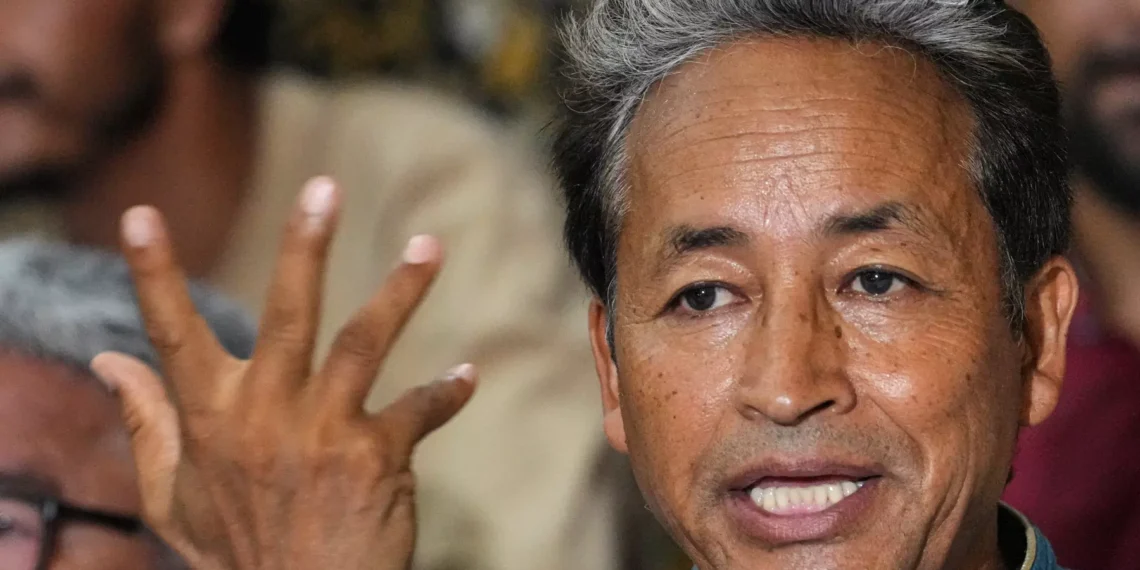Delhi cites security, critics call it a witch-hunt. Wangchuk’s detention under the NSA has exposed not just Ladakh’s struggle, but India’s uneasy balance with civil liberties.
BY Navin Upadhyay
October 5, 2025 – Detained climate activist and education reformer Sonam Wangchuk issued a defiant message from Jodhpur Central Jail on Saturday, demanding an independent judicial inquiry into the deaths of four protesters in Leh. The 52-year-old Padma Shri awardee, held under the National Security Act (NSA) since September 26, vowed to remain behind bars until his call is heeded.
Wangchuk’s statement, conveyed through his elder brother Ka Tsetan Dorjey Ley and advocate Mustafa Haji, carried both reassurance and resolve. “I am doing well, both physically and mentally, and thank everyone for their concern and prayers,” he said, while extending condolences to the families of the four killed in police firing on September 24. “There should be an independent judicial inquiry into the killing of our four people, and unless that is done, I am prepared to stay in jail,” he declared, underscoring his solidarity with Ladakh’s ongoing agitation for statehood and Sixth Schedule protections.
A Movement Deepening in the Hills
The unrest in Ladakh, carved into a Union Territory after the 2019 abrogation of Article 370 and bifurcation of Jammu and Kashmir, has intensified amid demands for constitutional safeguards and meaningful autonomy. The September 24 protests—jointly led by the Leh Apex Body and Kargil Democratic Alliance (KDA)—turned violent when police opened fire, leaving four civilians dead and more than 80 injured.
At the time, Wangchuk was on the 15th day of a hunger strike. Authorities accused him of inciting violence with “provocative statements” referencing the Arab Spring and Tibetan self-immolation protests. Though he called off his fast and left the site before clashes broke out, he was arrested two days later from his village and swiftly transferred to Jodhpur under the NSA, which permits detention without trial for up to a year.
Sonam Wangchuk’s message from Central Jail, Jodhpur.
Today on the 4th of October Ka Tsetan Dorjey Ley ( Sonam Wangchuk’s elder brother ) and advocate Mustafa Haji met Mr. Sonam Wangchuk at Jodhpur Central Jail.
Mr. Sonam has conveyed the following message to the people of… pic.twitter.com/pPl5OqTxXA— 𝐒𝐚𝐣𝐣𝐚𝐝 𝐊𝐚𝐫𝐠𝐢𝐥𝐢 | سجاد کرگلی (@SajjadKargili_) October 5, 2025
Official Justifications, Personal Denials
The Ladakh administration has sought to justify Wangchuk’s detention by linking him to alleged financial irregularities at the Himalayan Institute of Alternative Learning (HIAL), the experimental education project he co-founded with his wife, Gitanjali J. Angmo. Authorities recently revoked HIAL’s FCRA license, citing questions over foreign funding. Police have also alleged links to sources in Pakistan—claims Wangchuk has publicly dismissed, urging scrutiny of his NGO’s accounts to disprove what he called a politically motivated narrative.
READ: Opinion: If Wangchuk Is an Anti-National, The Nation Needs a Mirror
Defiance From Behind Bars
From prison, Wangchuk urged Ladakhis to pursue their demands “in the true Gandhian way of non-violence,” even as he endorsed the protest strategies of the Apex Body and KDA. Both coalitions have suspended dialogue with the Centre, demanding three conditions: a judicial probe into the September 24 killings, the activist’s release, and the withdrawal of all charges against him and other detainees.
Meanwhile, his wife has mounted a legal battle. On October 3, she filed a habeas corpus petition in the Supreme Court challenging his detention. The case, listed for hearing on October 6 before Justices Aravind Kumar and N.V. Anjaria, could prove pivotal. In a parallel appeal, she wrote to President Droupadi Murmu alleging a “witch-hunt” by state agencies, citing CBI and ED inquiries into HIAL, and sought his unconditional release.
Beyond Ladakh, Growing Pressure
Wangchuk’s detention has galvanized support far beyond Leh and Kargil. In Delhi, protests at Jantar Mantar—backed by the Congress and other opposition parties—echoed calls to free him. Social media campaigns under #ReleaseSonamWangchuk have trended nationwide, amplifying concerns that the crackdown represents a larger attempt to silence Ladakh’s demands for democratic safeguards.
READ: Sonam Wangchuk’s Legacy Stands Tall Amid NSA Charges
A Territory at the Crossroads
While curfews have eased in Leh and Kargil, the region remains tense. The killings of September 24, combined with the jailing of its most visible leader, have hardened public opinion. For many Ladakhis, Wangchuk’s defiance has become a symbol of resistance against what they see as Delhi’s indifference to their political and cultural aspirations.
As the Supreme Court prepares to hear his case, the stakes could not be higher. Whether Wangchuk walks free or remains in custody, his stance has already reframed Ladakh’s agitation—not just as a fight for constitutional guarantees, but as a broader test of India’s democracy, dissent, and justice.














